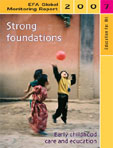
Le portail rinoceros d’informations sur les initiatives citoyennes pour la construction d’un autre monde a été intégré au nouveau site Ritimo pour une recherche simplifiée et élargie.
Ce site (http://www.rinoceros.org/) constitue une archive des articles publiés avant 2008 qui n'ont pas été transférés.
Le projet rinoceros n’a pas disparu, il continue de vivre pour valoriser les points de vue des acteurs associatifs dans le monde dans le site Ritimo.
Strong foundations : early childhood care and education
> EFA Global Monitoring Report 2007, 405 p. (pdf)
 The Education for All goals focus on the need to provide learning opportunities at
every stage in life, from infancy to adulthood, before 2015 - the target year for achieving these goals. Tackling disadvantage and setting strong foundations for learning begins in the earliest years
through adequate health, nutrition, care and stimulation.
The Education for All goals focus on the need to provide learning opportunities at
every stage in life, from infancy to adulthood, before 2015 - the target year for achieving these goals. Tackling disadvantage and setting strong foundations for learning begins in the earliest years
through adequate health, nutrition, care and stimulation.
The 1989 United Nations Convention on the Rights of the Child, ratified by 192 nations, guarantees the rights of young children to survive, develop and be protected. However, many children are deprived of these rights. This fifth edition of the EFA Global Monitoring Report assesses progress towards the first EFA goal, which calls upon countries to expand and improve comprehensive early childhood care and education, especially for the most disadvantaged children. Such interventions are crucial to improving children’s present well-being and future development.
Yet the evidence suggests that young children in greatest need, who also stand to gain the most, are unlikely to have access to these programmes. Coverage remains very low in most of the developing world and few programmes exist for children under age 3. Even in the context of limited public resources, designing national policies for early childhood carries benefits for the country’s entire education system. It is therefore vital that countries and the international community systematically make early childhood provision an integral component of their education and poverty alleviation strategies. This is essential for reducing extreme poverty and hunger, the overarching aim of the United Nations Millennium Development Goals.
- Read the full EFA Global Monitoring Report
- Read the summary report (pdf)
- Go to the website of the EFA Global Monitoring Report (stories on early childhood, EFA presentation, etc.)
date of on-line publication : 14 March 2007
© rinoceros - Ritimo in partnership with the Fph via the project dph and the Ile de France region via the project Picri. Site developed using SPIP, hosted by Globenet. Legal mentions - Contact









